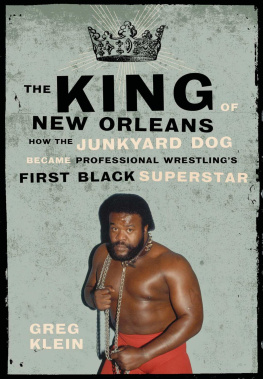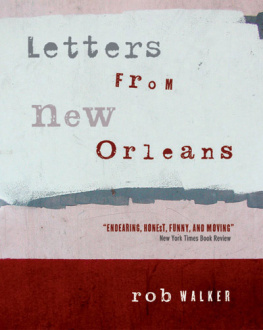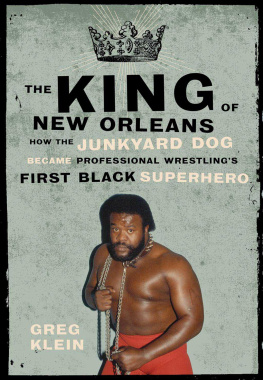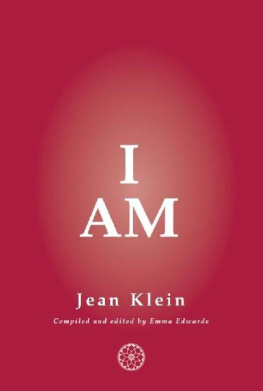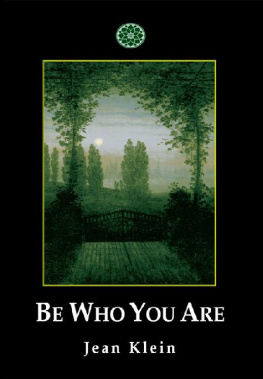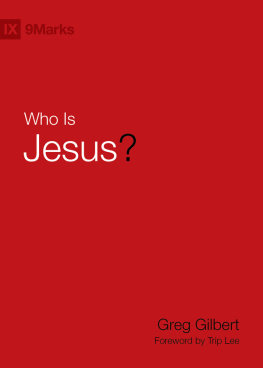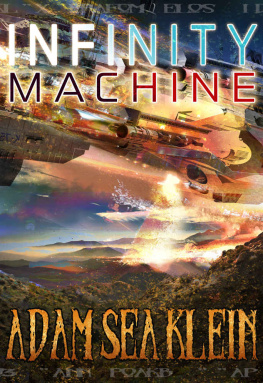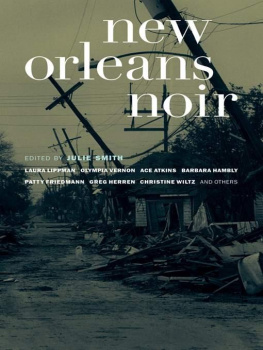Greg Klein - The King of New Orleans
Here you can read online Greg Klein - The King of New Orleans full text of the book (entire story) in english for free. Download pdf and epub, get meaning, cover and reviews about this ebook. year: 2012, publisher: ECW Press, genre: Detective and thriller. Description of the work, (preface) as well as reviews are available. Best literature library LitArk.com created for fans of good reading and offers a wide selection of genres:
Romance novel
Science fiction
Adventure
Detective
Science
History
Home and family
Prose
Art
Politics
Computer
Non-fiction
Religion
Business
Children
Humor
Choose a favorite category and find really read worthwhile books. Enjoy immersion in the world of imagination, feel the emotions of the characters or learn something new for yourself, make an fascinating discovery.
- Book:The King of New Orleans
- Author:
- Publisher:ECW Press
- Genre:
- Year:2012
- Rating:3 / 5
- Favourites:Add to favourites
- Your mark:
- 60
- 1
- 2
- 3
- 4
- 5
The King of New Orleans: summary, description and annotation
We offer to read an annotation, description, summary or preface (depends on what the author of the book "The King of New Orleans" wrote himself). If you haven't found the necessary information about the book — write in the comments, we will try to find it.
The King of New Orleans — read online for free the complete book (whole text) full work
Below is the text of the book, divided by pages. System saving the place of the last page read, allows you to conveniently read the book "The King of New Orleans" online for free, without having to search again every time where you left off. Put a bookmark, and you can go to the page where you finished reading at any time.
Font size:
Interval:
Bookmark:



PROLOGUE

When the Junkyard Dog appeared on the Mid South Wrestling scene, Tanya Dauphine was a ten-year-old living in the projects of St. Bernard Parish, just southeast of New Orleans. Everyone in her family watched wrestling, and she is what you would call a casual fan. She doesnt remember specific matches, and cant name any of the other wrestlers from that era without prompting, but she remembers one thing. When the kids would go out back after the show and play wrestling, she would only be one wrestler. I was the Junkyard Dog, said the round, middle-aged, dark-skinned woman with the spiderweb tattoo on her chest. That was my name. I always had to be the Junkyard Dog.
Dauphine wasnt alone in emulating JYD, and her reasons werent at all unique. It was the way he used to wrestle, she explained. He won all his matches.
Dauphine was one of many people I talked to while looking for JYD fans on the streets of New Orleans. I started my search by using the Internet and posting classified ads, but neither had worked. For whatever reason, Craigslist was a bomb, and even the wrestling and social-media web sites werent helping me connect with fans. So, I decided to take to the streets. It was either an attempt at old-school, shoe-leather reporting or, appropriately, like a JYD-style wrestling vignette. I headed to the Central Business District (CBD) to see if I could find fans of JYD simply by asking people about him. It didnt take long. The CBD is what other cities might call a downtown. It is adjacent to the French Quarter, and is a hub of legal and commercial activity. I walked around for several hours, finding fans at every turn.
This city loved him, says Gregory Bradley. Wrestling here went down without him. A native of rural Bogalusa, Louisiana, Bradley now works at Fredricks Deli on the famous St. Charles Avenue. I caught him on his smoke break, just as he was finishing up a mini-cigar. When I asked him if he knew who the Junkyard Dog was, he responded Sylvester Ritter, and lit up a second smoke.
Bradley started watching Mid South Wrestling when he was six, and remembers JYD from his earliest days, even before he returned from Calgary with a push. I remember when he was a bad wrestler, when he lost like 30 matches in a row. Then all of a sudden he started coming to the ring with that wheelbarrow and teaming with Buck Robley. It was like he never lost again. The fans loved him so much. He turned good, and the rest is history.
Bradley said that feuds with Ernie Ladd and the Freebirds stuck out most in his mind. When I asked him about the Butch Reed era and the heated rhetoric Reed used, he was straightforward, That was just two brothers hating on each other. It happens a lot. Thats all I saw with that. Another feud had a bigger effect on him. Ted DiBiase, now thats the one that broke my heart. I mean, your best friend, the best man at your wedding. How do you go and turn on him like that?
Actor and producer Clyde R. Jones had a different take on the Reed feud. You know, everybody knows if two black people use the N-word with one another we dont take it personally. But there is still a line. Butch Reed crossed the line. I think that was the point. They wanted people at home to take notice, to say, Wow, he really stepped over the line there. It became personal, and I think the point was to make it personal to the fans, too. Like, he really cut into my skin there.
Roger Dickerson remembers JYDs feud with Ernie Ladd for its intensity. Ernie Ladd, that was the one, he said. I dont know what it was, but those two couldnt get along for nothing. Dickerson grew up in the Jefferson Parish suburb of Avondale, and now runs his own business, Unlimited Concrete and Restorations. He remembers going to many matches at the Downtown Municipal Auditorium as a kid with his uncle. It was fun. It was just a thrill to be there. I remember one time I actually met Junkyard Dog. He shook my hand. I was never the same after that.
Despite rumors to the contrary, no one I talked to described the Auditorium as dangerous, even though it may have been in a bad part of town and the crowd could be aggressive. Some of the fans were violent toward the wrestlers, said B.J. LeBlanc of Marrero, Louisiana. I remember seeing wrestlers burned with cigarettes, fans pulling knives. And back in the day, if you told somebody wrestling was fake, youd better be ready to fight.
Still, LeBlanc and the others who attended the matches remember the Auditorium as a good place to watch wrestling. I used to go with my brother-in-law and we would take a co-worker of his who was black so no one would bother us, said LeBlanc. But nobody did bother us, anyway. Even back then, everybody went to the matches.
LeBlancs interest in wrestling predates Mid South and even Tri-State, and goes back to outlaw groups that used to run matches at a gym on Jefferson Parishs west bank. He went to matches at the Auditorium, the Superdome, and the Lakefront Arena. He admits that he preferred going to the modern Lakefront Arena, but he liked watching matches at the Auditorium, as well. The Superdome wasnt so great, he said. It was harder to see the matches. I guess it was more the thrill of being there and seeing the big matches.
Unlike the rest of the fans I interviewed, LeBlanc had other favorites besides Junkyard Dog: his all-time top act was the Rock n Roll Express. Still, he cheered for all the good guys, and was a big fan of the Dog. Junkyard Dog was everybodys favorite. Everybody loved him. It was just the right mix, right personality, right guy. No one even saw the color of his skin.
Jones seconded that assessment. He wasnt successful because he was a black man. You didnt even see black, you just saw JYD.
Joness statement echoed in my head. It was the same sentiment that Sylvester Ritters junior high football coach expressed to me the previous summer.
With JYD, promoter Bill Watts and company had experimented with making a black man the unquestioned star of the show. Some viewed it as a bold move, but most just recognized it for what it was: good business. I hadnt told Jones about Grizzly Smiths prophetic words from 1978, but he nearly nailed them anyway. I learned a long time ago, Jones said, green talks. You can have a black guy on the street or some guy who isnt a big star and he may be black to folks. But you take Eddie Murphy hes not black to people, hes just Eddie Murphy. It was the same way with JYD. He was just a star. You know, Rocky was popular back then, too. He was the ethnic hero, and people loved their ethnic heroes. Junkyard Dog was our Rocky. It may be harder, even in todays multimedia world, for a black man to cross over, but once you do, you can do anything. Junkyard Dog was everybodys hero. Everybody wanted him to win. Added Dickerson, Whatever it was, it sure worked. I can remember going to the Auditorium and standing in line for hours. People would get there early because it would sell out. They must have sold a lot of tickets.
They did, of course, sell a lot of tickets. By my unscientific estimate, they sold a million in New Orleans alone over a five-year period, almost all thanks to JYDs success. When he left, the era was almost immediately over. For a lot of the New Orleans fans, wrestling has never been the same.
I still follow it, said LeBlanc. Ill probably watch it later tonight. But its different. I liked it more back then. It was more realistic.
Font size:
Interval:
Bookmark:
Similar books «The King of New Orleans»
Look at similar books to The King of New Orleans. We have selected literature similar in name and meaning in the hope of providing readers with more options to find new, interesting, not yet read works.
Discussion, reviews of the book The King of New Orleans and just readers' own opinions. Leave your comments, write what you think about the work, its meaning or the main characters. Specify what exactly you liked and what you didn't like, and why you think so.

